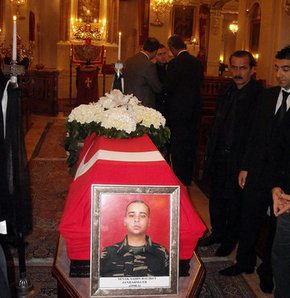
In recent years, there have been several
attacks against Armenians in Turkey. On April 24, 2011, Sevag Balikci
was killed by a fellow soldier.
“I noticed, thanks to my experience during the military dictatorship years, that there were dozens of policemen in plainclothes inside and around the church,” she told Armenian Weekly Editor Khatchig Mouradian in an interview.
Kuchuk’s funeral was held at the Armenian Church in Samatya (current name Mustafapasha), where hundreds gathered to pay their respects. “Both inside the church and the churchyard were full of people of all ages,” said Gunaysu, who attended the funeral. “While the coffin was being carried on the shoulders [of mourners], I saw Marissa’s daughter, hardly able to walk, held by the arms by two other middle aged women.”
On Dec. 29, Marissa Kuchuk was stabbed seven times and her throat was slit. The perpetrator(s) carved a cross on her chest using a sharp object, according to some Turkish newspaper and TV reports.
Gunaysu, who is also an active member of the Istanbul branch of the Human Rights Association, talked to the Armenian Weekly about the necessity and, at the same time, the impossibility of protesting against Kuchuk’s murder, because that would leave the victim’s family in a difficult situation.
Gunaysu and others from the Human Rights Association had visited the victim’s family a few days earlier. “The funeral and the visit we paid the family made me lost in a suffocating feeling that we can do absolutely nothing to help the family and their neighbors, because whatever we would do to protest this murder would make them feel even more uneasy,” she said.
“They know that they would be the ones who would pay for it in one way or another, while our protest would only provide us with the satisfaction of having fulfilled our ‘duty,’” she added.
Gunaysu pointed to “an enormous abyss separating us from the family. While we would try to defend human rights, they would be all alone in their daily lives in a world of denial.”
In recent years, there have been several attacks against Armenians in Turkey. Earlier in December, another Armenian woman was brutally attacked and robbed. Months earlier, an Armenian woman was called an infidel and attacked in a cab by the driver himself. On April 24, 2011, Sevag Balikci, an Armenian serving in the Turkish Army, was killed by a fellow soldier in what was clearly a hate crime on Armenian Genocide Commemoration Day. In January 2007, Turkish-Armenian journalist Hrant Dink was murdered in broad daylight in Istanbul.
According to human rights activists, the common thread that runs through all of these crimes is not just their being motivated by hate or being committed in an environment that breeds intolerance against Armenians, but also the efforts of the authorities to play them down and cover them up.

No comments:
Post a Comment